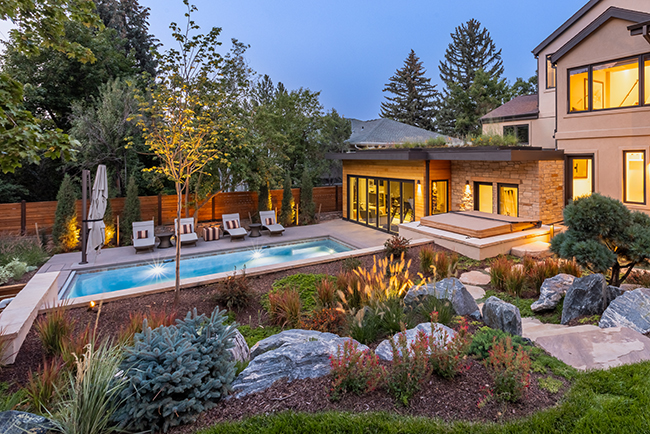Growing for the Good of It
28 Mar 2012
Yatahai Gardens grows everything it sells from seed—a distinction few greenhouses can claim.
By Lisa Marshall Photos by Thad Johnson It’s a frigid December day, with 6 inches of snow on the ground and a chill wind ripping across Boulder County’s eastern plains. But inside a humid 74-degree greenhouse at Yatahai Gardens, Thad Johnson has already begun to coax tiny bits of spring from their slumber. He hovers over a line of seed trays containing 30,000 plants-to-be, tenderly hand-misting each square with water as the trays bask in the sunlight streaming in. Halfway down the line, he stops in his tracks, a proud smile spreading across his face. “See that?” he says, pointing to a hollyhock seedling breaking through the dirt. “I will personally interact with every single plant here every single day until it goes out that door. How many greenhouse operators can say that?” In December, when many locals are consumed with holiday shopping, Johnson is painstakingly planting seeds by hand, one by one, cranking out 12 trays an hour on a good day. Throughout cold winter days, you can find him in his toasty greenhouse listening to Peter Tosh and U2 (which he says the plants love), as he gingerly transplants starts into larger pots, and prunes, waters and fertilizes his blossoming creations—with the help of only one employee.Not many. At a time when big-box garden centers overflow with plants hastily grown in commercial greenhouses, stacked on crates, shrink-wrapped and trucked cross-country in time for Mother’s Day, Johnson’s Yatahai Gardens has earned an almost cult following with its promise of being “Boulder County’s Only Garden Center That Grows Everything It Sells.” Come March, when Yatahai’s long-awaited opening day arrives, its three large greenhouses totaling 10,000 square feet have been transformed into a dense jungle of color with 100,000 bedding plants from more than 500 species of perennial and annual flowers, herbs and veggies. Some regular customers come from as far as Colorado Springs for Yatahai’s famous begonias and hanging flower baskets, which many regard as works of art.
- Yatahai’s bloom-filled flower baskets usually sell out by Mother’s Day, so get there early in the season if you want one.
Farming & Falling in Love
“You walk in and it’s just phenomenal,” says longtime customer Kristen Johnson. “It isn’t like going into a big-box store where there is really nothing special about it and everyone else is getting the same thing you are. It’s more like a treasure hunt.” Raised in South Dakota—a state where small farmers were hit hard in the ’70s by the proliferation of modern commercial farms elsewhere—Johnson, 41, never envisioned himself making a living off the land. But while attending the University of Colorado, he took a summer job pulling weeds and picking lettuce at a local organic farm for $6 an hour. He “fell in love” fast, and in 1995 dropped out of school to start his own farm—a move his parents, at first, were not keen on. “When I said, ‘I want to drop out of school and become a farmer,’ what they heard, being from South Dakota was, ‘I want to drop out of school and not have a job,’” he says.
- Each plant inside Yatahai’s greenhouses is grown from seed—a considerable task with impressive results.
 A self-described “begonia nerd,” he has also spent years toying with light timers and temperature gauges in order to create a climate suitable for growing plants that typically flourish in more tropical climes. Today, he offers 31 different varieties of begonias, along with nine kinds of dianthus, 11 types of impatiens, 10 varieties of marigolds and 32 petunia breeds.
He also creates roughly 4,000 hanging baskets per season, growing the plants together in the basket from tiny starts, carefully choosing each one for color, size and texture. “I’m kind of like a jazz musician. I know the mood I want to set with the plants, and I just have fun with it.”
After six months of prep, Johnson typically sells 70 percent of his plants in the 10 days before and after Mother’s Day. Then, after a quieter time of selling mums in fall and Christmas trees in early December, he starts the process over again—one seed at a time.
“It still just blows my mind that I can put a seed into one of those trays and all of a sudden it just pops up,” he says. “I can’t imagine doing anything else.”
Yatahai Gardens (yatahaigardens.com) is at 6870 Nelson Road in Longmont.
A self-described “begonia nerd,” he has also spent years toying with light timers and temperature gauges in order to create a climate suitable for growing plants that typically flourish in more tropical climes. Today, he offers 31 different varieties of begonias, along with nine kinds of dianthus, 11 types of impatiens, 10 varieties of marigolds and 32 petunia breeds.
He also creates roughly 4,000 hanging baskets per season, growing the plants together in the basket from tiny starts, carefully choosing each one for color, size and texture. “I’m kind of like a jazz musician. I know the mood I want to set with the plants, and I just have fun with it.”
After six months of prep, Johnson typically sells 70 percent of his plants in the 10 days before and after Mother’s Day. Then, after a quieter time of selling mums in fall and Christmas trees in early December, he starts the process over again—one seed at a time.
“It still just blows my mind that I can put a seed into one of those trays and all of a sudden it just pops up,” he says. “I can’t imagine doing anything else.”
Yatahai Gardens (yatahaigardens.com) is at 6870 Nelson Road in Longmont. 














